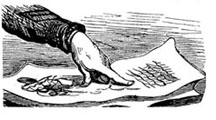
Letters to the Editor: January-February 1985
A True Picture
You may be interested in what a Hungarian artist who lives here had to say about Thomas Molnar’s article “Church & Society in Communist Hungary” (Nov.): “Thank you so very much for giving me the article about Hungary. It is the best picture — and a true picture — of the situation in my homeland. The rest of the writings about Hungary I’ve read in other periodicals are really false. With grateful thanks.”
Sister Susanne Prebilic
St. Scholastica Priory
Duluth, Minnesota
No One to Cluster With?
Stephen Settle’s article on Daniel Berrigan (Oct.) raised an interesting question: Why do issues cluster the way they do?
Case in point: Recently, I sent away for some pro-life materials. The anxiety provoked by receiving an amicable response from the Heritage Foundation was enough to shake my confidence in my pro-life beliefs. The Heritage Foundation advertises itself as “dedicated to the principles of free competitive enterprise, limited government, individual liberty and a strong national defense.” Although I am also for limiting our government, I doubt that they have in mind illegal CIA operations. That leaves me sharing with them a concern for individual liberty, and a pro-life and a pro-strong-nuclear-family position as well. But almost all their views on politics and economics seem to me to be not only mistaken but dangerous, idolatrous, and sinful as well. Which is to say that, while I remain their uneasy bedfellow on pro-life and some family issues, I don’t cluster well with them at all.
A recent New York Times Magazine article refers to the clustering in the NOR as “a curious mix” of “liberal” political and “conservative” cultural views. Interesting. But has anybody asked the question, “Why do we cluster the way we do?” and not meant it as a rhetorical question? (The answer to the rhetorical question is, of course, because we are smarter than those who cluster differently.) Seriously, the phenomenon of issues clustering is more curious than the clusters themselves.
I am very much with the NOR on most of its cultural and political views, and I also consider myself a Christian. But alas, I am theologically more “liberal” than the NOR. At least (to slough over a host of specific points) I find myself theologically closer to Teilhard de Chardin than to C.S. Lewis (though some of his stories are excellent). So, I am concerned. It would seem that perhaps I have no one at all to cluster with.
Jim Hunter
Lincoln, Maine
“Unjust Social Structures”?
In his review of Donal Dorr’s Option for the Poor: A Hundred Years of Vatican Social Teaching (Nov.), Dale Vree speaks of “unjust social structures,” a cliché of the Left. Also “sinful structures” (not sinful or unjust law, which one might understand, though asking “what law?”).
Some modern architecture in its dullness is sinful — and, if it housed a dance hall, a sinful social structure. Still, that may not be Vree’s meaning. If he means private property (which popes have defended), he should say so. But then worker ownership would be sinful, too.
What are unjust social structures?
Sheldon Vanauken
Lynchburg, Virginia
DALE VREE REPLIES:
I am not aware that Joseph Cardinal Ratzinger, prefect of the Vatican’s Congregation for Doctrine of the Faith, has ever been characterized as a man of “the Left.” Yet, in his critique of liberation theology (issued on Sept. 13, 1984) he said, “There are structures which are evil and which cause evil and which we must have the courage to change.”
The popes have never given an unqualified endorsement to private property, and in the encyclical Laborem Exercens we see Pope John Paul II saying that private property is legitimate only when it “serves labor,” and that workers’ self-management of enterprises is a commendable development of the principle of private property.
In his pilgrimage to Canada in 1984, John Paul gave several examples of unjust social structures. For instance, he rebuked economic situations where enterprises respond “only to the forces of the marketplace” and are ruled by “the profit motive of the few rather than the needs of the many.” Not surprisingly, he called for a “restructuring of the economy” which aims at workers’ self-management.
Of course, no social order will be the equivalent of the Kingdom of God, and so we may expect workers’ self-management to produce its share of injustices (hopefully fewer).
If one is going to eschew the term “unjust social structures” because it is also used by “the Left,” one may be cutting off one’s nose to spite one’s face. For, how can one criticize communism adequately if one refuses to utter the term “unjust social structures”?
Delightful Conversation
I would like to express to you the deep gratitude of Sister M. Justitia Downes. Sister received the NOR and would share its ideas with me. Many a delightful conversation we had based on articles you published.
Before Sister died she had asked me to write you and ask you to communicate her gratitude to the priest from the South who had given money so that Sister could receive the NOR.
May the Holy Spirit continue to guide you and assist you in your great work.
Sister Eamon
IHM Convent, Marywood
Scranton, Pennsylvania
You May Also Enjoy
Have mercy, Lord, and by your blood
wash from my brain
the sly recurring pain
…Newton's terminal date is reckoned by the prophets Daniel and John that the return of Christ will commence 1,260 years after the restoration of the Roman Empire.
The psychology of attire is the yearning for the life it expresses. So how are the kids dressed? How are the parents dressed?
